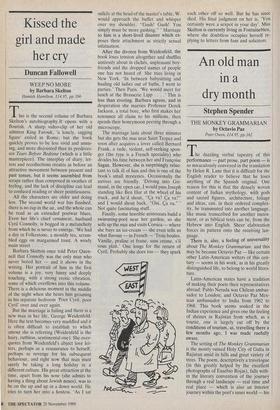Kissed the girl and made her cry
Duncan Fallowell
WEEP NO MORE by Barbara Skelton Hamish Hamilton, £14.95, pp.166 This is the second volume of Barbara Skelton's autobiography.It opens with a flourish. A sharp video-clip of her old admirer King Farouk, 'a lonely, sagging figure' exiled in Rome; but the book quickly proves to be less vivid and amus- ing, and more disjointed than its predeces- sor Tears Before Bedtime (which is a little masterpiece). The interplay of diary, let- ters and recollections creates as before an attractive movement between present and past tenses, but it seems assembled from scraps rather than composed in swathes of feeling, and the lack of discipline can lead to confused reading or sheer pointlessness.
All the characters are older and doing less. The second world war has finished, there is no zap in the air, and the whole can be read as an extended postwar blues. Even her life's chief ornament, husband Cyril Connolly, is bogged in a melancholy from which he is never to emerge. 'We had a day in Folkestone, a mouldy tea, scram- bled eggs on margarined toast. A windy main street . . . .'
Barbara Skelton once told Peter Quen- nell that Connolly was the only man who never bored her — and it shows in the writing. Her portrait of him in the first volume is a joy, very funny and deeply touching, with a strong erotic vibration, some of which overflows into this volume. There is a delicious moment in the middle of the night when she hears him groaning in his separate bedroom 'Poor Cyril, poor Cyril' over and over again.
But the marriage is failing and there is a new man in her life, George Weidenfeld. Here the text becomes very muddled and it is often difficult to establish to which amour she is referring (Weidenfeld is the hairy, ruthless, sentimental one). She over- quotes from Weidenfeld's abject love let- ters, perhaps as a reassurance to herself, perhaps as revenge for his subsequent behaviour, and right now that man must surely be taking a long holiday in a different culture. His great attraction at the time, apart from his nose (she admits to having a thing about Jewish noses), was to be on the up and up in a down world. He tries to turn her into a hostess. 'As I sat sulkily at the head of the master's table, W. would approach the buffet and whisper over my shoulder, "Gush! Gush! You simply must be more gushing." ' Marriage to him is a short-lived disaster which ex- poses their attachment as strictly sexual infatuation.
After the divorce from Weidenfeld, the book loses tension altogether and shuffles aimlessly about in clichés, unpleasant boy- friends and the dropped names of people one has not heard of. She tries living in New York. 'In between babysitting and hauling old ladies out of baths, I went to parties.' Then Paris. 'We would meet for lunch at the Brasserie Lipp . . . .' This is less than riveting. Barbara agrees, and in desperation she marries Professor Derek Jackson, a total bore, who first makes her renounce all claim to his millions, then spends their honeymoon peering through a microscope.
The marriage lasts about three minutes but she gets the mas near Saint Tropez and soon after acquires a lover called Bernard Frank, a rude, violent, self-seeking spon- ger (the type is a French speciality) who divides his time between her and Francoise Sagan. However, she is surprisingly reluc- tant to talk ill of him and this is one of,the book's small mysteries. Occasionally the natives are friendly. 'Driving into Gri- maud, in the open car, I would pass Joseph standing like Ben Hur at the wheel of his truck, and he'd shout, "Ca va? Ca va?" and I would shout back, "Oui. ca va." ' Not quite fascinating stuff.
Finally, some horrible aristocrats build a swimming-pool near her garden, so she sells up the mas and visits Corsica — where she buys an ice-cream — she even tells us what flavour — in French — 'Trois boules. Vanille, praline et fraise, sans crème, s'il vous plait.' One longs for the return of Cyril. Probably she does too — they spark each other off so well. But he has since died. His final judgment on her is, 'You certainly were a sexpot in your day'. Miss Skelton is currently living in Fontainebleu, where she doubtless occupies herself re- plying to letters from fans and solicitors.










































































 Previous page
Previous page